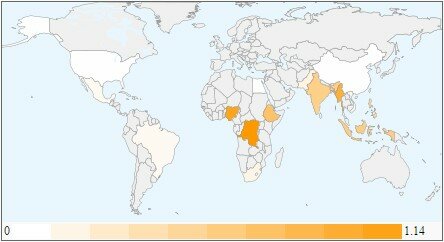By Whitney McInvale and Alex Gordon
Earlier this this year, Director Emeritus of the Pan American Health Organization (PAHO), and Special Envoy for the Global Network for Neglected Tropical Diseases, sat down with the Diplomatic Courier – a leading global affairs magazine – to discuss her experience as the first female Regional Director of the World Health Organization (WHO), and her thoughts on the post 2015 development agenda and the Ebola crisis.
During her interview, Dr. Roses shared interesting insights from her distinguished career as a public health champion.
On being the only woman in the room…
“In my time at medical school, women were the minority. … And of course, almost all of the professors were male. Also in the hospital environment—with the exception of nurses, who were all female—the doctors were all male. That was the gender division of labor. But I think that my generation was the generation of change. We started occupying some of the positions that had never been occupied by women before.”
Dr. Roses elaborated that once men were ready to challenge gender norms, male bosses and mentors began to open doors for her. These opportunities, combined with her skilled and tireless work, led her to become the first woman regional director of the WHO. And now, more and more woman are taking top positions in the WHO, she explains.
“Today, we can say that we have a Regional Director in the Euro-region, also the first woman. The first female Regional Director in Southeast Asia, and the first female Regional Director for Africa was just elected in November. We also have a female Regional Director that succeeded me in the Americas. So now there are four female Regional Directors…and we have a female Director General, Dr. Margaret Chan.”
On her passion for eliminating neglected tropical diseases (NTDs)…
“I am also a Special Envoy for the Global Network for Neglected Tropical Diseases. [There is a] big coalition of many organizations working for the elimination of neglected tropical diseases in the world by 2020.
[NTDs] are mostly parasitic diseases that have been [with] humanity for thousands of years. Today, we have all the tools and knowledge to eliminate them. …they are still so related to poverty, to vulnerable people, and to excluded communities that we call them ‘neglected.’”
On the Post 2015 Development Agenda…
As the Millennium Development Goals (MDGs) come to a close, the Diplomatic Courier asked Dr. Roses to discuss her thoughts on what the forthcoming post-2015 development agenda will – and should – focus on:
“I think that the struggle is, again, to find a short list that will focus the attention of all countries on what the world requires to become more peaceful, more equitable, safer and more sustainable. I think that the concern about the environment is now right at the top. I think that the environment, along with peace, security and human rights, will become [more important] than they were in the MDGs.”
Dr. Roses has also voiced her support for the inclusion of NTDs in the post-2015 development agenda, stating that:
“If NTDs are not clearly identified in the final post-2015 development agenda and the corresponding sustainable development goals, they will once again remain as forgotten and invisible as the people and communities affected by them.”
On the Ebola crisis…
“There are also many lessons learned, particularly the fact that we need to strengthen health systems where the people are. If the people don’t have tools for everyday problems, including the delivery of babies, accidents, and so on, no one will be looking at the problem and no one will be able to respond to the problem.”
To read the full interview, click here.




